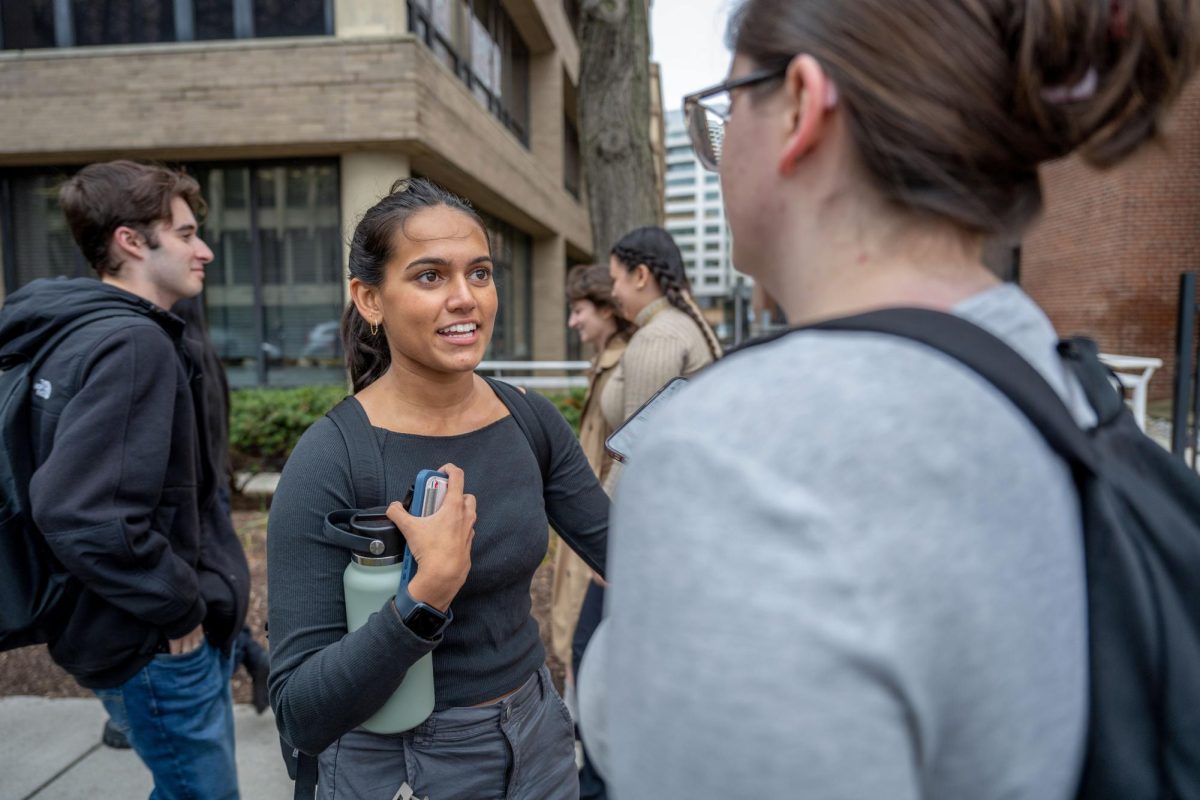How can we improve dining hall food? Who will bring transparency and visibility to our student governing body? And how should the Student Government Association foster campus community and heal campus tensions stemming from the war in Gaza?
These are the main questions on the minds of almost 100 students as the University nears this year’s SGA elections. Among the dozens of desires that students expressed for their elected representatives, three issues reigned supreme:
Dining hall food quality, operating hours
In 2023, the University completed its transition to a dining hall-centric campus dining system with the implementation of dining halls in three buildings. Concerns over dining hall hours, food quality and religious and allergy inclusivity have since dominated campus dialogue, shaping the campaign initiatives of five of six presidential and vice presidential candidates — Dan Saleem, Ethan Fitzgerald and Ethan Lynne.
With GW’s dining system in its relative infancy, students think there’s more work to be done. Nearly 40 students said dining is one of the biggest problems that on-campus students face, expressing a desire for more variety, better quality food and no early dining hall closures before breaks.
First-year Katie Stabile, who lives on the Mount Vernon Campus and dines frequently at the Eatery at Pelham Commons, said there needs to be more variety in the food offered at Pelham, as there tends to be the same options repeatedly each meal. She said lots of people who live on the Vern end up commuting to Foggy Bottom for food because of the more diverse array of options.
“It tends to be the same thing over and over again,” Stabile said. “You don’t want to just be commuting for food.”
The SGA launched an investigation in January to discuss why dining halls closed during first semester finals. Vice presidential candidate Ethan Lynne said he is planning on advocating for dining halls to be open a week in advance for students returning from winter break early.
First-year Maya Kilani said she knows multiple people who have gotten food poisoning from the dining halls and wants the SGA to address these concerns by raising them to the administration. More than a dozen students said they got food poisoning from Thurston and Shenkman dining halls earlier this semester.
“I’ve known so many people who have gotten food poisoning,” Kilani said. “I’ve gotten food poisoning.”
Dining officials said they do regular internal inspections, weekly third-party food safety audits, implement “rigorous” food safety protocols like temperature checks and regular staff training over University breaks. They also plan to add a full-time, on-site food safety manager to GW Dining staff.
She said she and a few of her friends talked with presidential candidate Ethan Fitzgerald about their issues with the dining halls which “kind of” made her want to vote for him. If elected, Fitzgerald will continue the dining hall focus group established by current Vice President Demetrius Apostolis in September to connect GW students with dining facilities, according to his presidential platform.

Advocate for students’ rights surrounding campus discord
Following the outbreak of the Israel-Hamas war in October, GW and District-wide groups organized protests, vigils and walkouts. The demonstrations have sparked questions about the limitations of free speech from faculty, officials and students, as well as nationwide.
More than a dozen students said they want the SGA to use their platform to push officials to afford students the right to express any opinions without censorship or restraint.
First-year David Lopez said he wants the SGA to advocate for the University to allow more free speech for students. He said student organizations don’t have as much power as the SGA to make change, but as the governing body with connections to administration and other resources, the SGA has the power to make change.
“If they have the ability to advocate, that puts some pressure on the school because whether it be just like student organizations or stuff like that, it doesn’t really materialize much change,” Lopez said. “But since SGA is a student governing body directly related with the school, there’s more weight to their voice.”
First-year Sophia Dalal said she wants the SGA to show students that it is acceptable to use their free speech on campus and speak out about issues they are passionate about. She said they can do this through social media advertisements of students protesting or demonstrating for different causes.
“If the SGA shows videos of other people speaking and showing their free speech and just making sure that people know that it’s okay to talk and it’s okay to mention what they think is important, would be very helpful,” Dalal said. “Just so that people know that they’re not alone when speaking out.”
None of the candidates for vice president or president included initiatives to improve campus community following discord after the breakout of the war in their platforms.
The SGA created a pair of student councils in December to advocate for Jewish and Israeli students and Arab, Muslim and Palestinian students in response to campus tension surrounding the ongoing conflict in the Middle East. The University has also implemented programming to discuss issues of free speech on campus with officials like Dean of Students Colette Coleman and Director of Student Rights and Responsibilities Christy Anthony.
Students are unaware of what the SGA does and want more transparency
Last year’s SGA elections saw the lowest voter turnout in at least a decade, with only about 8.5 percent of eligible students casting a vote — in line with a steady decline in voter turnout since 2019. This year, more than 15 students reported that potential candidates asked them to sign their petitions to get their name on the ballot, but students reported not knowing anything about the functions of the governing body or their initiatives.
The SGA posts its initiatives on its Instagram, like expanding the hours of the Student Health Center, breakfast at Pelham and subsidizing the cost of emergency contraception. But more than a dozen students said they wanted more outreach about specific policies the SGA is implementing.
Junior Reva Patel said she could not name any major SGA projects because they were not communicated effectively, contributing to a lack of awareness about upcoming elections and the candidates running.
“They can be more engaging with the student body and definitely be more open about ideas that they have,” Patel said. “And also get more input from students on campus.”
Five SGA candidates for vice president and president — McCormick, Lynne, Fitzgerald, Saleem and Lauren Harris — mentioned transparency or increased presence in their campaign platform. Candidates campaigned on being more present at campus events and bolstered social media engagement and weekly update videos to inform students on the SGA’s activity.
Brooke Forgette, Emma Khodaverdian, Fiona Bork and Kellen Hoard contributed reporting.





